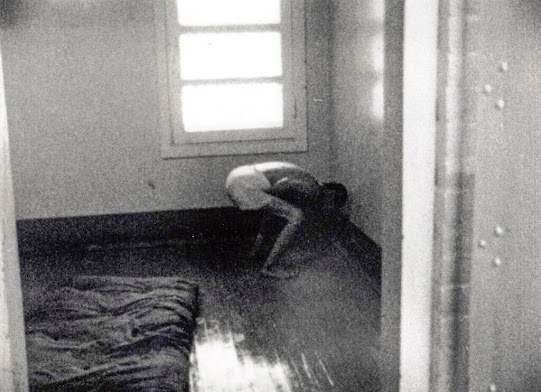The Warmth and Coldness of Institutions
Salesman (David & Albert Maysels, 1968), Titicut Follies (Frederick Wiseman, 1967) and Gandhi's Children (David MacDougall, 2008) exemplify three very different approaches to observational cinema as Anna Grimshaw and Amanda Ravetz point out in their article. They all throw the viewer in the middle of the action, letting them to figure out the network of relationships on their own. They do not offer arguments or interpretations (explicitly at least), the audience is left to make judgments for themselves.
The filmmakers also make an interesting choice of depicting institutions which seems like a difficult topic. Wiseman is the most radical in this choice: he does not assign main characters/ethnographic subjects that could ground the viewer (although there are recurring characters among the walls of Bridgewater State Hospital). His representation of the mental institution is cold and detached - and this (seeming) objectivity can be shocking. His unflinching gaze follows abuse, force feeding and the preparation of a corpse for a funeral. He seems to be far from the guards and the inmates alike. He intentionally makes his movie "ugly", he leaves flawed shots, weird angles and obnoxious sound in the final material. People are shouting, bearing their teeth and slapping on walls. As Grimshaw and Ravetz state Wiseman intentionally disorients the audience within the walls of the institution. Everything is angular walls, bare surfaces, dirty floors and naked, violated bodies. As one of my classmates pointed out, Wiseman's approach is very Foucauldian in its focus on big institutions and their compulsive practices of demarcating "normal" from "abnormal".
The Maysels brothers and MacDougall show much more intimacy and warmth in their representations, although both of them offer an insight into quite cruel and inhumane institutions. They approach their subjects with more empathy and choose some specific, lovable, fallible characters. Among the Bible salesmen there is camaraderie despite the cruel corporate system that pushes them to compete and in the orphanage depicted in Gandhi's Children the kids demonstrate affection (as well as bullying and abuse) toward each other. The Maysels and MacDougall also offer more orientation for the viewer and explain more the workings of their systems. Wiseman leaves us alone amongst the confusing, violent rituals and practices of Bridgewater - his intention is to replicate the cold, inhumane feelings elicited by the institution in order to upset and shock us. The Maysels and MacDougall are not so fast in their judgments, they do not claim that the humiliating system of Bible selling and the state care of Indian children is clearly good or bad. They show examples of both unpleasant and heartwarming instances so the audience can see the whole picture.




Megjegyzések
Megjegyzés küldése